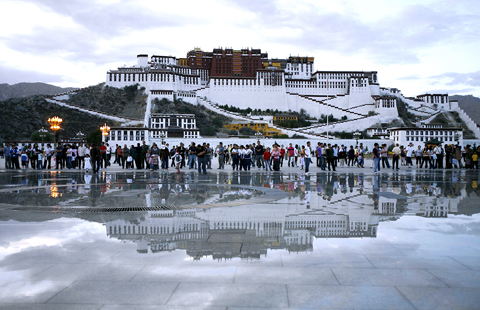China has completed a seven-year renovation of Tibet’s Potala Palace — home to the Dalai Lamas until the region’s spiritual leader fled during an aborted uprising against Communist rule 50 years ago.
China said the project was part of its plan to promote Tibetan culture and language in the region as it develops its economy, of which tourism forms a major part. The renovation, which also repaired the Norbu Lingka, a summer palace for the Dalai Lamas, cost 300 million yuan (US$43.9 million), a report from the state-run news agency said yesterday.
But many Tibetan exiles say the Himalayan region’s cultural heritage has been threatened by Beijing’s restrictions on the native Buddhist religion and the Tibetan language as well as a government-orchestrated mass migration of Han Chinese in the last three decades.

PHOTO: AP
A large number of monasteries and other artifacts also were destroyed the Cultural Revolution, from 1966 to 1976, although the Potala was spared in the violence.
In March last year, riots erupted in Lhasa to protest Chinese rule. In response, Beijing poured troops into Tibetan areas and intensified its vilification of the Dalai Lama, accusing him of instigating the unrest.
The spiritual leader, who fled China in 1959 and now lives in exile in India, has said that restrictions on Tibet’s religious practices have resulted in a “cultural genocide.”
A ceremony was held on Sunday on the square in front of the Potala — whose facade looms over the city of Lhasa — Xinhua news agency said.
“The reparation of the three key cultural relics is an important part in the conservation of the Tibetan culture,” said Liu Yandong (劉延東), a member of the Chinese Communist Party’s Politburo, who attended the ceremony.
More than 189,000 workers were involved, and the government also spent 94.74 million yuan repairing the Sagya Monastery, which houses classical Buddhist texts, Xinhua said.
Xinhua quoted a former director of the Potala’s administration office saying the palace could now accommodate 1,000 visitors a day.
The renovations are part of a 570 million yuan plan to promote tourism to Tibet, a mainstay of the region’s economy, and include the repair to 22 cultural sites.
Earlier this year China tightened restrictions on advertising and construction outside the palace, following calls from the UN to better preserve the UNESCO World Heritage Site’s natural setting.
Although palaces have existed on the grounds of the Potala since the seventh century, the current building dates from the rule of the fifth Dalai Lama, known as the “Great Fifth,” who started its construction in 1645.
It was then used as living quarters and a winter palace by the Dalai Lamas.

Nauru has started selling passports to fund climate action, but is so far struggling to attract new citizens to the low-lying, largely barren island in the Pacific Ocean. Nauru, one of the world’s smallest nations, has a novel plan to fund its fight against climate change by selling so-called “Golden Passports.” Selling for US$105,000 each, Nauru plans to drum up more than US$5 million in the first year of the “climate resilience citizenship” program. Almost six months after the scheme opened in February, Nauru has so far approved just six applications — covering two families and four individuals. Despite the slow start —

North Korean troops have started removing propaganda loudspeakers used to blare unsettling noises along the border, South Korea’s military said on Saturday, days after Seoul’s new administration dismantled ones on its side of the frontier. The two countries had already halted propaganda broadcasts along the demilitarized zone, Seoul’s military said in June after the election of South Korean President Lee Jae-myung, who is seeking to ease tensions with Pyongyang. The South Korean Ministry of National Defense on Monday last week said it had begun removing loudspeakers from its side of the border as “a practical measure aimed at helping ease

MOGAMI-CLASS FRIGATES: The deal is a ‘big step toward elevating national security cooperation with Australia, which is our special strategic partner,’ a Japanese official said Australia is to upgrade its navy with 11 Mogami-class frigates built by Japan’s Mitsubishi Heavy Industries, Australian Minister for Defence Richard Marles said yesterday. Billed as Japan’s biggest defense export deal since World War II, Australia is to pay US$6 billion over the next 10 years to acquire the fleet of stealth frigates. Australia is in the midst of a major military restructure, bolstering its navy with long-range firepower in an effort to deter China. It is striving to expand its fleet of major warships from 11 to 26 over the next decade. “This is clearly the biggest defense-industry agreement that has ever

DEADLY TASTE TEST: Erin Patterson tried to kill her estranged husband three times, police said in one of the major claims not heard during her initial trial Australia’s recently convicted mushroom murderer also tried to poison her husband with bolognese pasta and chicken korma curry, according to testimony aired yesterday after a suppression order lapsed. Home cook Erin Patterson was found guilty last month of murdering her husband’s parents and elderly aunt in 2023, lacing their beef Wellington lunch with lethal death cap mushrooms. A series of potentially damning allegations about Patterson’s behavior in the lead-up to the meal were withheld from the jury to give the mother-of-two a fair trial. Supreme Court Justice Christopher Beale yesterday rejected an application to keep these allegations secret. Patterson tried to kill her